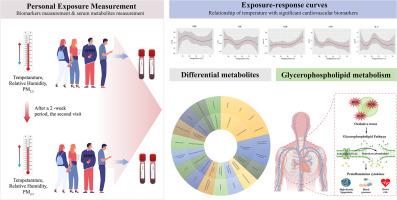Metabolism disruption induced by high ambient temperature
IF 2.7
引用次数: 0
Abstract
Background
Previous studies have assessed the cardiovascular risk attributable to high ambient temperature. However, the mechanisms underly acute cardiovascular responses associated with high ambient temperature remain incompletely understood.
Objective
To identify acute cardiovascular responses associated with high temperature, and to understand the underlying mechanisms using metabolomics.
Methods
We conducted a prospective panel study on young adults, organizing participants to undergo blood collection and temperature monitoring tautologically. Levels of 10 cardiovascular biomarkers and 4473 serum metabolites were measured. Levels of ambient temperature exposure were recorded by wearing personal monitors. We employed linear mixed-effect models to identify acute cardiovascular responses associated with ambient temperature, including differential biomarkers and metabolites. KEGG pathway analysis was performed on the differential metabolites to identify temperature-associated metabolic processes.
Results
Exposure to elevated ambient temperature was associated with acute cardiovascular responses, including alterations in high-density lipoprotein, interleukin-6, C-reactive protein, diastolic pressure, and heart rate. These observed acute cardiovascular responses are probably attributed to metabolism disturbances, as 129 differential serum metabolites, accompanied by disruptions in 18 pathways, were identified. These differential metabolites and pathways primarily involve glycerophospholipid metabolism, which activates inflammation cytokines and subsequently induces adverse cardiovascular effects.
Conclusions
Our findings suggest that elevated ambient temperature could potentially lead to cardiovascular responses among young adults in China. We propose that high ambient temperature exposure may contribute to acute cardiovascular effects by regulating the glycerophospholipid metabolism pathway.

高环境温度引起的新陈代谢紊乱
背景以往的研究评估了环境温度过高对心血管造成的风险。方法我们对青壮年进行了一项前瞻性小组研究,组织参与者进行血液采集和温度监测。测量了 10 种心血管生物标志物和 4473 种血清代谢物的水平。通过佩戴个人监测器记录环境温度暴露水平。我们采用线性混合效应模型来确定与环境温度相关的急性心血管反应,包括不同的生物标志物和代谢物。结果暴露于升高的环境温度与急性心血管反应有关,包括高密度脂蛋白、白细胞介素-6、C 反应蛋白、舒张压和心率的改变。这些观察到的急性心血管反应可能归因于新陈代谢紊乱,因为发现了 129 种不同的血清代谢物,以及 18 种途径的紊乱。这些不同的代谢物和途径主要涉及甘油磷脂代谢,而甘油磷脂代谢会激活炎症细胞因子,进而诱发不良的心血管反应。 结论:我们的研究结果表明,环境温度升高有可能导致中国青壮年的心血管反应。我们认为,暴露于高温环境中可能会通过调节甘油磷脂代谢途径导致急性心血管效应。
本文章由计算机程序翻译,如有差异,请以英文原文为准。
求助全文
约1分钟内获得全文
求助全文
来源期刊

Hygiene and environmental health advances
Environmental Science (General)
CiteScore
1.10
自引率
0.00%
发文量
0
审稿时长
38 days
 求助内容:
求助内容: 应助结果提醒方式:
应助结果提醒方式:


